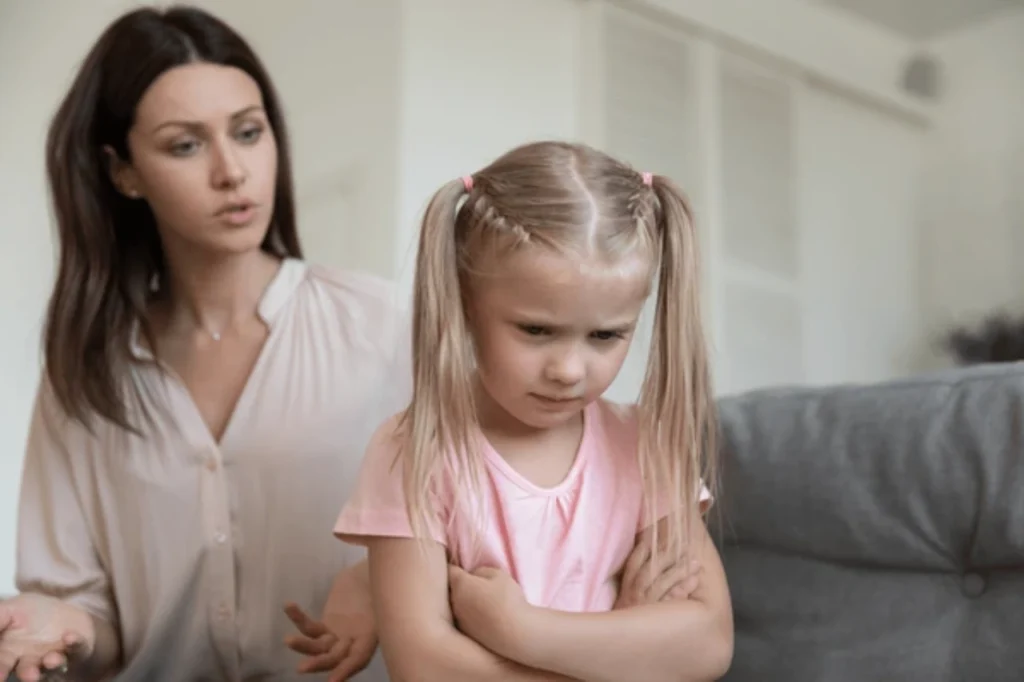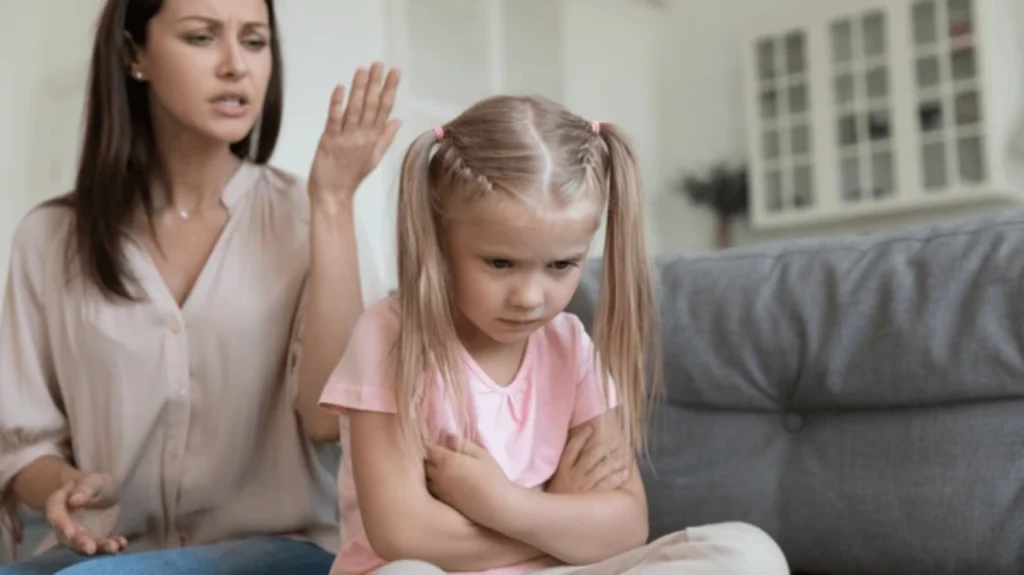Rebellion in Children is a normal part of growing up, happening at different times. As parents, you might find yourself in disagreements with your kids. Knowing why they act out and how to manage it can help avoid constant fights. Rebellion shows up in different ways for each child, so you need to tailor your approach.
Key Takeaways
- Rebellion is a normal part of child development, happening at different stages.
- Understanding the causes of rebellious behavior is crucial for effective management.
- Adjusting parenting strategies based on the child’s age can help curb rebellion.
- Clear boundaries, consistent discipline, and open communication are essential.
- Seeking professional help may be necessary for serious behavioral issues.
Understanding the Nature of Child Rebellion
Rebellion is a normal part of growing up, especially in the teenage years1. During this time, kids start to want more freedom and may disagree with their parents1. The brain’s part that helps with making good choices and controlling feelings doesn’t fully grow until the mid-20s1. So, teens often choose to hang out with friends and follow what they do instead of listening to parents1.
Developmental Stages of Rebellion
Rebellion shows up in different ways as kids grow1. Teenagers might ignore homework, try alcohol or drugs, break rules, take risks, or show off their style1. It’s important for parents to stay involved to help teens make good choices1. The brain’s reward system, which likes fun and excitement, starts to develop during these years1.
Common Triggers and Warning Signs
Many things can make kids act out2. Most kids go through a rebellious phase during their teens2. If this behavior gets too much, it can upset the whole family and hurt a child’s growth2. Kids might rebel because they feel their parents are too hard on them, which can hurt their self-esteem2.
Impact on Family Dynamics
Rebellious behavior can really change how a family works together2. Too much criticism from parents can damage the relationship and hurt a child’s feelings2. Kids might act out to protect their self-image, and too much criticism can make them feel unloved2. Feeling unloved can lead to risky behavior or substance abuse as a way to cope2.
It’s key for parents to understand why kids rebel, how it changes over time, and how it affects the family123. Parenting Science and LeanParents offer great advice on dealing with this issue123.
The Psychology Behind Rebellious Behavior

Rebellious behavior in kids often comes from a need for control and freedom. Most kids go through a rebellious phase in their teens, where they resist their parents’ rules.2 Hunger or lack of sleep can make kids act out, especially in younger ones. Problems at home or bullying can also cause defiant actions.
Kids may rebel to show who they are, test limits, or get attention. Criticism from parents often triggers rebellion, leading to defiance and anger.2 Being raised in an authoritarian way can lower a child’s self-esteem, leading to worse behavior and more punishment.2 Knowing why kids rebel is key to solving the problem.
Too much criticism from parents can hurt the parent-child bond and harm the child’s mental health.2 Feeling harshly judged can make kids resentful, angry, and defiant.2 Excessive criticism can weaken attachment, lower self-esteem, and lead to self-destructive behaviors in kids.2
Criticism can make kids feel insecure and unloved, affecting their ability to trust love in the future.2 Unaddressed psychological wounds from rebellion and negative interactions with parents can lead to addiction in adulthood.2
Understanding the reasons behind rebellious behavior is crucial for parents to build a strong, supportive relationship with their kids.
Over half of teenagers will try alcohol, but nearly half won’t.4 About 40% of teenagers will try drugs at least once, but 60% won’t.4 Less than 25% of teenagers who try illegal substances regularly use them, showing most don’t.4 There’s evidence of a drop in teenage sexual experimentation, shown by a decrease in pregnancy rates.4 Teen crime statistics have stabilized, with girls now involved in crimes like armed robbery and car theft as much as boys.4
Teenage rebellion is a major cause of conflict between parents and their teenagers.5 Hormonal changes in teens can lead to rash decisions and impulsive actions.5 The prefrontal cortex, which controls decision-making and personality, starts practicing in the teen years.5 Teenagers are heavily influenced by their peers and may imitate their friends’ lifestyles.5 Parents’ over-worrying can make teenagers ignore them when they talk.5 Teenagers seek attention and may act out to get it.5 Parents need to understand that teenage rebellion is a normal part of growing up.5 Teenagers crave independence and struggle to control their lives.5
Essential Tips for Managing Rebellion in Children
Dealing with child rebellion needs careful thought and action. As a parent, it’s important to set clear rules and stick to them6. Teenagers often rebel as they look for their identity and want more freedom6. By talking openly and understanding each other, you can help them through this tough time.
Setting Clear Boundaries
It’s vital to set clear rules to manage rebellious behavior. Instead of just telling them what to do, involve your child in making rules7. This way, they feel more responsible and less resistant7. Many parents struggle with kids who are rebelling, and setting clear rules is a big step towards fixing things.
Maintaining Consistent Discipline
Being consistent with discipline is crucial when dealing with a rebellious child. Don’t punish on impulse or yell, as it can make things worse7. Stick to the consequences you’ve set7. Understanding your child’s pain and addressing the behavior, not their character, helps in fixing things.
Building Open Communication
Good communication is key in managing rebellion. Listen actively, ask open-ended questions, and have honest talks6. This lets your child share their thoughts and feelings, helping you understand them better6. Balancing giving them freedom while guiding them is important for a healthy relationship.
By following these tips, you can handle child rebellion and improve your relationship with your child. Remember, patience, empathy, and open communication are essential during this challenging time.
Age-Appropriate Approaches to Handling Defiance
Dealing with defiance in kids needs a careful, age-based strategy. For the young, like toddlers and preschoolers, short talks and simple words work best8. They show defiance to feel independent and in charge, driven by their needs and wants8. Using the “illusion of choice” helps them feel in control while guiding them9.
With older kids and teens, deeper talks are possible. Parents can let some real-life lessons happen, but keep them fair9. Research shows that strict punishments, like spanking, don’t really teach kids or stop defiance10. Instead, being supportive and working together can help prevent depression in kids who act out10.
As kids get older and smarter, parents need to change how they discipline them. Knowing why and when a child acts helps parents find better ways to connect10.
| Age Group | Recommended Approach |
|---|---|
| Toddlers and Preschoolers | Keep conversations short, use simple vocabulary, and offer the “illusion of choice” to foster a sense of control. |
| Older Children and Adolescents | Allow some real-world consequences, while avoiding harsh punishments. Engage in more in-depth discussions and adjust expectations as reasoning skills develop. |
Being flexible and age-aware in handling defiance helps parents through the ups and downs of child development1089.
Creating a Supportive Home Environment
Creating a nurturing home is key to handling rebellious kids11. Rebellion is normal in teens, showing many behaviors11. Setting clear rules and involving kids helps a lot11. Keeping these rules strict shows stability and order11.
Establishing Family Rules
Work with your kids to make family rules. This way, everyone knows and agrees on them11. Talk about why each rule is important and listen to their ideas11.
Fostering Emotional Safety
Emotional safety is crucial in a supportive home12. Be open and understanding, encouraging your kids to talk11. Show empathy and tell them your home is a safe place for feelings11.
Promoting Positive Interactions
Focus on your kids’ good points and praise them11. This boosts their confidence and shows good behavior is valued11. Also, plan fun family times to strengthen bonds12.
By making your home supportive, your kids will feel safe and less likely to rebel12. A bit of empathy and patience can help a lot with teen rebellion11.
The Role of Emotional Intelligence in Managing Rebellion
Teaching your child emotional intelligence is key to handling rebellion. As a parent, showing the right emotional responses is important. It helps your child understand and share their feelings13.
Knowing why your child acts out is the first step to solving the problem. By teaching them how to deal with anger and frustration, you help them manage their emotions13.
Empathy is crucial in managing rebellion13. It lets you see things from your child’s point of view. This empathy helps you respond with care and understanding13.
Good communication is at the core of emotional intelligence13. It lets you talk openly with your child about their feelings and actions13. This way, you can solve problems and grow closer to your child.
| Emotional Intelligence Skill | Description | Benefit for Managing Rebellion |
|---|---|---|
| Cognitive Empathy | The ability to understand another person’s perspective and thoughts | Helps parents comprehend the reasons behind their child’s rebellious behavior |
| Social Empathy | The ability to sense how others are feeling and respond accordingly | Allows parents to tailor their approach and communication to their child’s emotional state |
| Empathetic Concern | The ability to feel and act on the emotional needs of others | Motivates parents to provide the necessary support and guidance to help their child overcome rebellious tendencies |
By improving emotional intelligence, you can make a supportive environment for your child. This can lessen rebellious behavior, leading to better interactions and a stronger bond13.
Communication Strategies for Parents
Effective communication is key in handling rebellion in the parent-child relationship. By using active listening, you can make your child feel heard and understood. Avoid judgmental statements and try to see things from your child’s point of view. Use “I” statements to share how their actions make you feel. Have serious talks in neutral places to keep the focus on solving problems, not placing blame14.
Active Listening Techniques
Active listening is more than just hearing what your child says. It means fully engaging, thinking about what they say, and showing you get it through words and body language15. This builds trust and opens up communication, which is vital during the tough teenage years14.
Non-Confrontational Dialogue
When talking about tough topics with your rebellious teen, keep the tone calm. Stay away from power struggles and look for areas of agreement. Encourage your child to share their thoughts and feelings without fear of judgment. This creates a safe space for real and honest talks, strengthening your bond15.
Effective communication goes both ways. By listening well and talking calmly, you can handle teenage rebellion and build a stronger, more trusting relationship with your child16.
Setting Boundaries Without Being Authoritarian

As a parent, setting clear boundaries for your children is key. But, it doesn’t mean you have to be strict all the time17. Being authoritative, not authoritarian, is better for raising a self-reliant child17. The trick is to find a balance between setting rules and respecting your child’s freedom.
Explaining the reasons behind your rules can help your child understand and follow them better17. Sometimes, let your child help decide on the rules that affect them. This makes them feel more responsible and involved.
When enforcing rules, be firm but kind. Avoid fights by giving your child choices within limits17. Know the difference between rules for safety and preferences. This way, you build a better, more respectful relationship with your child.
| Authoritarian Parenting | Respectful Parenting |
|---|---|
| 18Authoritarian parents have many rules they expect kids to follow without question. | Respectful parents let kids help decide, allowing for some negotiation and compromise. |
| 18Authoritarian parenting can cause problems like depression, anxiety, and rebellion in kids. | Respectful parenting helps kids feel more in control and understood, leading to better outcomes. |
Remember, your parental authority should match with child autonomy and respectful parenting. By setting clear rules and listening to your child, you create a caring space. This space helps your child grow and strengthens your bond.
“The ratio of positive to critical comments for effective communication is suggested to be 2:1, with six positive comments for every negative one yielding the best performance17. Rabbi David Saiger recommends using the ‘sandwich method,’ with two positive comments for every critical comment, for successful communication.”17
By sticking to these guidelines, you can set boundaries without being seen as strict. The goal is to make a caring space where your child can grow and be independent. This way, you keep your authority while supporting your child’s development.
Understanding Root Causes of Rebellion in Children
Rebellion in children is complex, with many factors at play. Studies show that teens are trying to find their identity. They may feel overwhelmed by adult expectations, leading to resentment19. Children also want to be independent, seeking control and making their own choices19.
Peer influence is a big factor, as kids try to fit in and be like their friends19. They may act out to get attention, especially if they don’t get enough at home19.
Environmental Factors
- Family dynamics, including parental expectations and communication patterns
- Peer pressure and the need to conform to social norms
- School situations, such as academic pressure or social challenges
Psychological Triggers
- Low self-esteem and anxiety
- Underlying issues like bullying or learning difficulties
- A need for attention and recognition
Psychological factors, like risk-taking and brain development, also play a role19. Research shows that kids today are less likely to hide their true selves to please parents20. Rebellion might be a way for them to be heard, not just to rebel20.
To manage rebellion, understanding its causes is key. Parents can then support their children’s growth and strengthen family bonds.
| Environmental Factors | Psychological Factors |
|---|---|
| Family dynamics | Low self-esteem |
| Peer pressure | Anxiety |
| School situations | Attention-seeking behavior |
“Rebellion can help teens express opinions, cultivate independence, and boost self-confidence during the critical developmental stage.”19
By tackling the child behavior analysis, environmental influences, and psychological factors behind rebellion, parents can better support their children’s growth and well-being.
The Impact of Parenting Styles on Rebellious Behavior
Parenting styles are key in shaping a child’s growth and actions. The 2014 US Census shows that 25% of kids live with one parent, while 75% live with two married ones. This varies by race and ethnicity21. How parents interact with their kids greatly affects their behavior, leading to either rebellion or adjustment.
Authoritarian parents, who are strict and harsh, might make kids more rebellious. Yet, these kids may act well but could be aggressive21. In contrast, authoritative parents balance love and rules. This style boosts kids’ confidence, responsibility, and emotional health, improving their social and academic life21.
Permissive parents, who are lenient, can also lead to rebellion. Their kids might have unhealthy eating habits, risking obesity21. Uninvolved parents, who are distant, can cause problems too. Their kids may struggle with emotions, school, and social skills21.
Finally, parenting styles greatly affect a child’s actions. Therapy, culture, and friends also play a role as kids grow22. By knowing how different parenting styles work, parents can find the right balance. This helps their kids grow up well-adjusted and happy.
In short, parenting styles deeply influence a child’s likelihood of being rebellious. Authoritarian and permissive styles can lead to defiance. But authoritative parenting tends to make kids more well-adjusted. By grasping the differences in parenting styles, parents can guide their kids towards positive behavior and healthy growth.
Building Trust and Respect with Your Child
Building a strong bond with your child is key to handling rebellious behavior. Always treat your child with respect, even when you’re disciplining them. Keep your promises to build trust23. Listen to your child’s feelings and views, even if you don’t agree23.
Be consistent in what you expect and how you act23. Show real interest in what your child likes and does. A respectful relationship can help avoid bad behavior23.
Trust and respect are closely linked24. Parents face many challenges while raising their kids. It’s important to be patient and understanding24.
When your child rebels or struggles spiritually, believe in them and stay committed. This can lead to healing24.
Building a strong bond is hard but it’s worth it23. Show unconditional love and support your child’s uniqueness. This creates a safe space where they feel valued and heard, reducing bad behavior23.
| Strategies for Building Trust and Respect | Benefits |
|---|---|
|
|
Building trust and respect is a journey that needs patience, empathy, and dedication23. By focusing on these key areas, you can overcome rebellion and help your child grow into a confident, well-adjusted person23.
“The family tradition includes sharing admiration on special occasions, like Father’s Day, and this tradition has helped to maintain a strong bond between the parent and child.”24
When to Seek Professional Help
Managing rebellion in children can be tough, but sometimes, you need professional help. Look for signs like persistent defiance, aggressive behavior, or symptoms of depression, anxiety, or self-harm25. These are clear indicators it’s time to seek a mental health professional.
If your child’s behavior is severe and lasting, it could be a sign of Oppositional Defiant Disorder (ODD). In such cases, a family therapist or child psychologist can offer crucial support and advice25.
Don’t worry if you need to seek intervention, behavioral therapy, or join parenting support groups. It shows you’re committed to your child’s well-being. With the right help, you can guide your child through this tough time and help them overcome rebellious behaviors26.
FAQ
What are the common developmental stages of rebellion in children?
What are some common triggers and warning signs of rebellious behavior in children?
How does rebellious behavior impact family dynamics?
What are the psychological factors behind rebellious behavior in children?
What are the essential tips for managing rebellious behavior in children?
How should the approach to handling defiance differ based on a child’s age?
What are the key elements of creating a supportive home environment to manage rebellion?
How can developing emotional intelligence help in managing rebellious behavior?
What communication strategies are effective in managing rebellion?
How can parents set clear boundaries without resorting to authoritarian parenting?
What are the environmental and psychological factors that can trigger rebellious behavior?
How do different parenting styles impact rebellious behavior?
Why is building trust and respect crucial in managing rebellion?
When should parents seek professional help to manage rebellion?
Source Links
- Why Do Teens Rebel and What Can Parents Do? | Turnbridge
- The Rebellion of the Over-Criticized Child
- Teen Rebellion: Behavior With a Reason – Meier Clinics
- Teenagers: Why Do They Rebel?
- Why Does Teenage Rebellion Happen?
- How to Survive Your Teen?s Rebellious Phase | Child Focus
- 7 Steps for Restoring a Rebellious Child
- Defiant child: How to handle defiance in 3-, 4-, and 5-year-olds
- How to Get Your Kids to Listen: Tips for Managing Defiance in Young Children
- 8 Effective Ways to Handle Defiant Children
- 10 Tips on How to Deal with a Rebellious Teenager – Sedona Sky Academy
- Issues I Face: Helping Parents Survive Adolescent Rebellion
- Parenting: Emotional Intelligence or Emotional Ignorance
- Parenting Rebellious Teens: Navigating Unique Dynamics with Understanding
- Strategies for Parents Needing Help to Manage Teenage Rebellion
- Understanding Teenage Rebellion:5 Causes & Coping Strategies
- A Teen’s Guide to Establishing Boundaries with Parents
- Here’s Why Experts Don’t Recommend the Authoritarian Parenting Style
- Why Teens Are Compelled to Rebel—and What You Can Do About It — Ambre Associates
- Here’s the Real Reason Your Teenager Rebels
- Types of Parenting Styles and Effects on Children – StatPearls
- Negative Parenting Styles: Signs and Effects on Kids
- How to plan to deal with a rebellious child?
- Teaching Kids to Trust – Fierce Parenting
- Knowing When to Seek Treatment for Your Child
- How To Support Rebellious Teens





